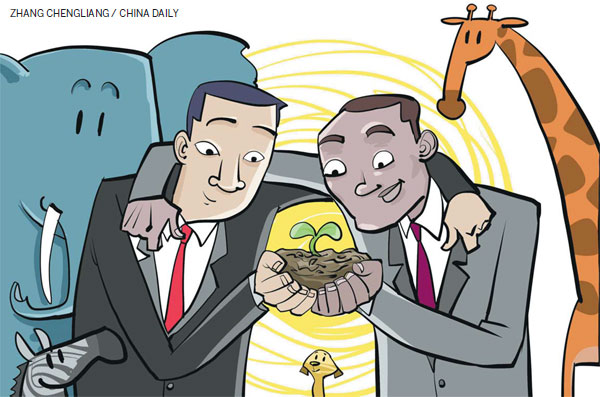China's environmental diplomacy in Africa
The Awakening of a nation to the need to better protect nature is benefiting a continent
China is finding that the effects of more than 30 years of high-speed economic growth are forcing it to use more of its resources to deal with environmental issues.
Africa, however, is having to deal with environmental problems caused by the outside world.

These two realities have made environmental protection and sustainable development top priorities for both China and Africa. That has made environmental protection an important area for China-Africa cooperation.
Documents from 2005 show that until that point, this type of collaboration between China and Africa was very weak. However, from the beginning of 2005, a different picture emerges. That year, China and the United Nations Environment Programme jointly hosted the China-Africa Environment Cooperation Conference, which marked the beginning of formal collaboration.
In 2009, China proposed establishing the China-Africa Partnership and holding consultations on an as-needed basis. Later, the China-Africa Environment Protection Ministerial Meeting was formalized. It is held before the UN Climate Change Conference, an arrangement that is of great help to China and African countries in coordinating their positions.
In last May, Chinese Premier Li Keqiang unveiled his proposal for closer China-Africa ties during a speech at the African Union Conference Center in Addis Ababa. His proposal, dubbed the 461 Framework included an increase in environmental protection projects as one of its six priorities.
China and African countries have carried out a series of such projects, including meteorological infrastructure, forest protection, biodiversity, disaster prevention, wild animal protection and environmental personnel training. China has provided training for more than 400 environmental workers from 30 African countries.
As the biggest trading partner and an important investor, China's economic presence in Africa has raised environmental concerns. It is often said that China's companies operating in the continent are concentrated in areas that are environmentally sensitive, such as oil exploration, mining and hydropower, and that even infrastructure projects such as the construction of roads and railways have environmental impacts.
China's companies are also accused of not following international standards. Environmental problems in China are cited as an excuse to make these accusations. To a large degree, these doubts have exaggerated the truth, and they have dismissed the progress China has achieved in recent years.
Environmental protection and control have been recognized as a top priority by the Chinese government, according to Chen Jining, head of the Ministry of Environmental Protection. In the past three years, China has boosted annual spending for environmental protection by 100 billion yuan ($16.1 billion, 14.8 billion euros). China will spend 8-10 trillion yuan through public and private channels on the environment in the coming few years. More importantly, this year China has begun to enforce its strictest environmental protection law, which has faced resistance by some local governments because it is expected to lead to the shutdown of many factories.
The evolution of China's environmental protection policy has greatly influenced the country's environmental cooperation with Africa. The Chinese government encourages companies to go global, but now they are also required to go green.
In 2013, China's ministries of commerce and environmental protection published the Environmental Protection Guideline for Overseas Investment and Cooperation, which requires companies to carry out environmental impact assessments based on the standards of host countries. These regulations encourage companies to pay greater attention to environmental protection and corporate social responsibility.
Sinopec Ltd, the giant Chinese oil and chemical company, has built an effective wastewater processing system in Sudan and South Sudan, and adopted measures to avoid damaging water and soil in Ghana, according to Sinopec in Africa 2013, the company's first corporate social responsibility report for Africa.
There is still room for Chinese companies to improve their capacity for such projects. But given the application of pressure by the Chinese government, international partners and African countries, Chinese companies are on the right track for going global and green at the same time.
It is encouraging that more and more Chinese people and social organizations have a better understanding of Africa and have increasingly begun to love this amazing continent, as well as to protect it.
In recent years the Chinese government has formulated strict regulations on the smuggling of elephant ivory. This has helped change attitudes, and for Chinese people such ivory is not so much a sign of wealth and luxury as it is a sign of shame. Last year, China promised to provide a $10 million grant for African wildlife conservation. Also, Chinese organizations such as the Mara Conservation Fund are working at the frontline of African wildlife protection like their foreign peers. This is a sign of huge progress for China's civil society, and certainly good news for Africa.
China is shouldering its environmental responsibility in Africa just as it is at home. China is sharing its developmental and environmental protection expertise with African countries, supporting Africa's green economy and sustainable development, and shaping new models of harmonious relations between development and the environment for developing countries. The awakening and going to Africa of China's environmental protection groups demonstrate that environment issues are not just the business of the Chinese government, but also the responsibility of the Chinese people.
The author is a research fellow at the Shanghai Institutes for International Studies. The views do not necessarily reflect those of China Daily.


















